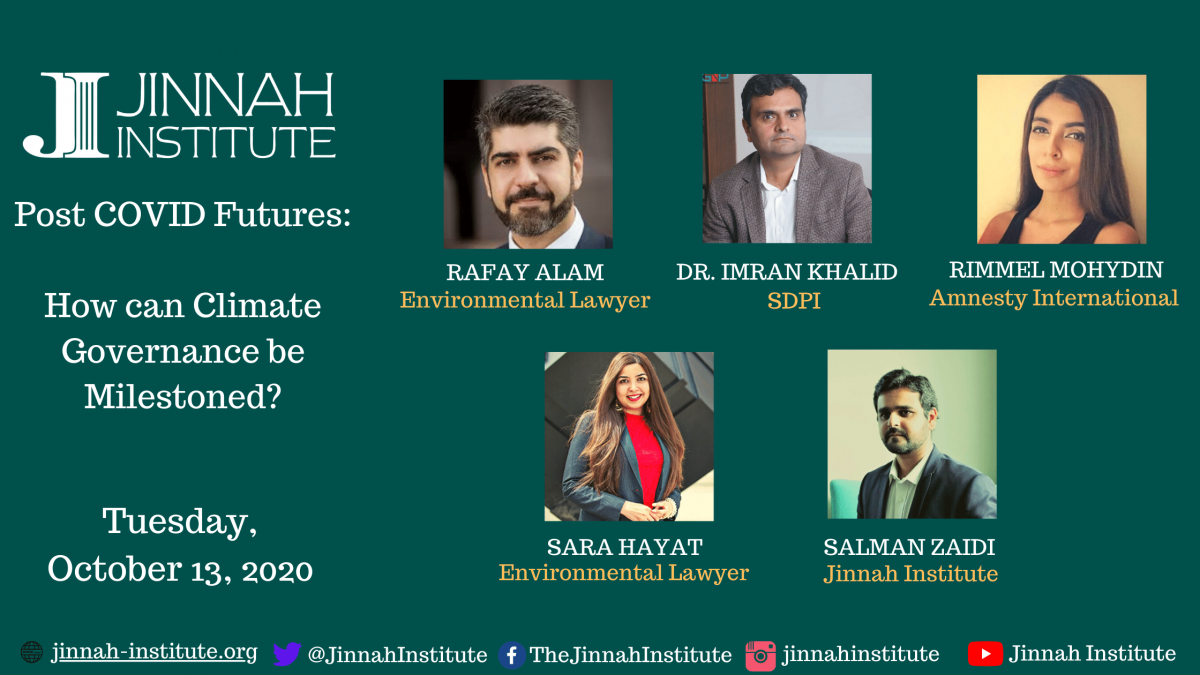Post COVID Futures Round Table
How can Climate Governance be Milestoned?
Date: October 13, 2020
Moderator:
Rafay Alam, Environmental Lawyer
Speakers:
-Dr. Imran Khalid, SDPI
-Rimmel Mohydin, Amnesty International
-Sara Hayat, Environmental Lawyer
There is no denying that the COVID pandemic has exacerbated the impact of climate change in Pakistan, especially playing on the fault lines of existing social injustices across social strata, agreed climate change experts and environmental lawyers at Jinnah Institute’s virtual roundtable on climate governance. Discussing Pakistan’s vulnerabilities and adaptive capacities to the global healthcare crisis, it was obvious that the already hard-hitting effects of climate change have enabled the spread of the pandemic, and state machinery has remained largely unprepared. Urban flooding in Karachi is one example that alludes to effects of climate change in Pakistan.
Dr. Imran Khalid emphasized the distinction between social justices and injustices, arguing that winners and losers that have emerged from the COVID crisis in Pakistan are largely separated by their access to resources. While scientists around the world have been warning against the irreversible effects of climate change, the pandemic should force us to rethink our approach to growth. Localized policies are crucial for the implementation of mitigation and adaptation programs. Dr. Khalid also highlighted the importance of bringing a balanced gendered perspective into policy making at a national level to bridge the gaps of Pakistan’s climate change policy.
Sara Hayat questioned the dominant narrative that there is a link between the COVID-19 pandemic and the climate change crisis. “The reason the two are being linked together is because they both impact the economy and disrupt our way of life. But the similarities end there.” The core difference between the two is that while the pandemic has an end in sight, that is not the case with regards to the climate crisis. On the question of adaptability measures being instituted by the government and if any lessons can be applied from the government’s response to the pandemic, Sara Hayat explained that no serious measures have been taken thus far, especially at the grassroots level. She further explained that disaster relief management and climate change policy are not necessarily the same thing; therefore, it is hard to see how Pakistan’s response to COVID-19 could inform its approach to tackling climate change. Climate change is impacting lives on a daily basis by disrupting agriculture and fisheries. People in rural areas are on the frontline of climate change which is why there should be a constant stream of economic relief for the people worst impacted by this crisis. “It is imperative that we invest in sustainable agriculture. If Pakistan continues to invest in steel and infrastructure, while the climate change policy is limited to planting trees, that is perhaps disingenuous on part of the Pakistani government.’
On the topic of what local data could better help shape Pakistan’s climate change policy, Rimmel Mohydin explained that local vocabulary and knowledge is extremely important for the proper implementation of any climate change measures. “Because the climate change crisis has been communicated in such a scientific manner, it has been hard to convey the severity of the issue.” Moreover, the discourse surrounding climate change has been very North focused, and countries in the global South – where people are most affected by climate change – do not really have a voice in the conversation. Additionally, we need to start at the very basic level before we can start identifying the data points we need to be tracking. “We need to start by developing a local vocabulary that sufficiently conveys the urgency and severity of the crisis on our hands.”
Regarding systemic issues that act as impediments in the way of formulating an effective climate change policy, Sara Hayat opined that no policy can be effective unless the issue at hand is understood properly. She further added that, “whatever policy we devise, it needs to be a bridge that takes our economy into consideration along with tackling climate change. If not, no politician will be willing to enact those policies at the expense of the economy, similar to what we witnessed during COVID-19. So, there is a need to frame the policies in a way which stresses that we are saving lives along with benefiting the economy in the process.” Dr. Imran Khalid chimed in to outline the three core areas the government should focus on. First, there is a need to focus on the science of climate change and gain a better understanding of how it impacts us. For this purpose, there is a need to invest in modelers, physicists, and climatologists who can get to the heart of the matter. Second, the gender perspective needs to be incorporated by bringing in female researchers who understand the cultural barriers that exist when conducting fieldwork in rural areas. Lastly, it is important to understand and strengthen our institutions. “We need to research our institutions and understand how these policies are perceived by people in different parts of the country who are responsible for the implementation of these policies.”
Discussing the link between climate change and human rights, Rimmel Mohydin explained that in the climate change context, policy makers and activists have to figure a way out to convey the same level of urgency for a slow-burn issue like climate change. She concluded by stating that, “when we framed the smog issue in Lahore as a human rights issue, it actually helped personalize the issue for a lot of people. Therefore, this requires new thinking on our part, to figure out how we can manufacture the urgency that unfortunately is not organically conveyed in the case of the climate change crisis.”
Follow the link to watch full video:

